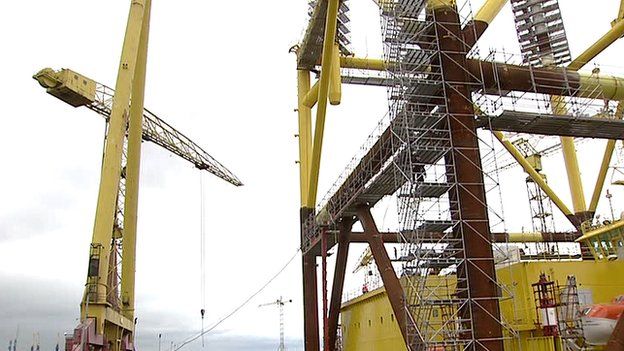NI 1987 State papers: Government urged closure of Harland and Wolff
- Published

The papers show that the Secretary of State, Tom King, recommended the closure of the shipyard in 1987.
The government recommended the closure of the former shipbuilding giant, Harland and Wolff, in 1987, according to newly declassified files.
They show that in 1987, faced by mounting losses and missed deadlines, the Secretary of State, Tom King, recommended the closure of the shipyard.
At the same time, however, a confidential memo from the NIO warned of the possibility of serious political unrest in the Protestant community if the 3,000-strong workforce was paid off.
The problems at the yard surfaced in a memo from D J Watkins of the NIO to David Fell of the Stormont Department of Economic Development (DED) on 24 June, 1987.
The official reported that the Secretary of State "was deeply disturbed to hear your report of increased cash difficulties [at] Harland and Wolff."
Mr King understood that the company was in need of an immediate injection of £10m and wanted to know why the need for additional cash had not been identified earlier.
The papers reveal former NI Secretary of State Tom King, now Lord King of Bridgwater, recommended the closure of the shipyard
Budget breach
In a confidential memo on 30 June, 1987, Peter Viggers, the Stormont Industry Minister ascribed the difficulties at the firm to its failure to complete a stage in the construction of a Swops oil tanker (designed to draw oil from submerged sea wells).
More serious, in Mr Viggers' view, was the breach by the company of its annual budget.
He added: "I believe we have now reached crisis point in our dealings with Harland and Wolff."
It was essential that the government acted decisively as cash flow problems at the firm had become "a recurring problem".
This suggested "a reversal of our current hands-off approach of leaving management to manage and of market forces to determine the size of the yard".
One option was to place the company in receivership, he wrote.
At a follow-up meeting between the minister and John Parker, the Harland and Wolff managing director, on 2 July, 1987, Mr Parker was "shaken" by the minister's determination to send in a firm of accountants "to let the government know the true position".
'Potentially catastrophic'
On 4 September, 1987 Mr Viggers received the report from Deloitte, Haskins and Sells on the financial problems of the yard.
It warned the DED that it could no longer accept the "over-optimistic assumptions" of management.
It was Deloitte's understanding that another major vessel, the AOR was also behind schedule.
In their view, Harland and Wolff had adopted unusual commercial practices: for example, earlier that year, a director, close to retirement, had been made technically redundant, enabling him to receive a redundancy payment of £40,000.
In November 1987, the Northern Ireland Secretary noted the lack of "acceptable orders" for Harland and Wolff and the danger of the firm accepting a "potentially catastrophic" order for a holiday liner.
While acknowledging that the closure of the yard would have "a profound impact on morale in Northern Ireland" he nonetheless felt that "the yard should be closed after the AOR tanker was completed".
Titanic under construction in Harland and Wolff shipyard
Paramilitaries
Moves to shut down the Belfast shipyard elicited a plaintive memo from F G McConnell of the NIO to Secretary of State Tom King on 9 September, 1987.
This warned of the political and security implications of any phased-down closure of Harland and Wolff in view of its symbolic and psychological significance in the region.
The official added: "It is thought that, within the loyalist community, reaction, particularly in east Belfast, would be along the lines of the opposition which followed the signing of the Anglo-Irish Agreement.
"Like the Agreement, the closure of Harland and Wolff would be perceived as an act of betrayal by Her Majesty's Government and a further step towards withdrawal from the province.
"One restraint on the opposition to the signing of the Agreement was a fear of unemployment. The closure of Harland and Wolff would remove that restraint and those affected could well believe they have little to lose.
"It is likely that this mood would be exploited by loyalist paramilitaries and the effect on political progress could also be serious."
McConnell's concerns were supported by the head of the Northern Ireland Civil Service, Sir Ken Bloomfield, in a memo to officials on 4 November, 1987 in which he noted that "the reaction in Northern Ireland to the immediate closure of the shipyard would be pretty serious".
In the event, the yard was not closed thanks to a management/employee buy-out in partnership with the Norwegian shipping magnate, Fred Olsen.
Shipbuilding finally ceased at Harland and Wolff in 2003.
- Published21 August 2015
- Published21 August 2015
- Published21 August 2015